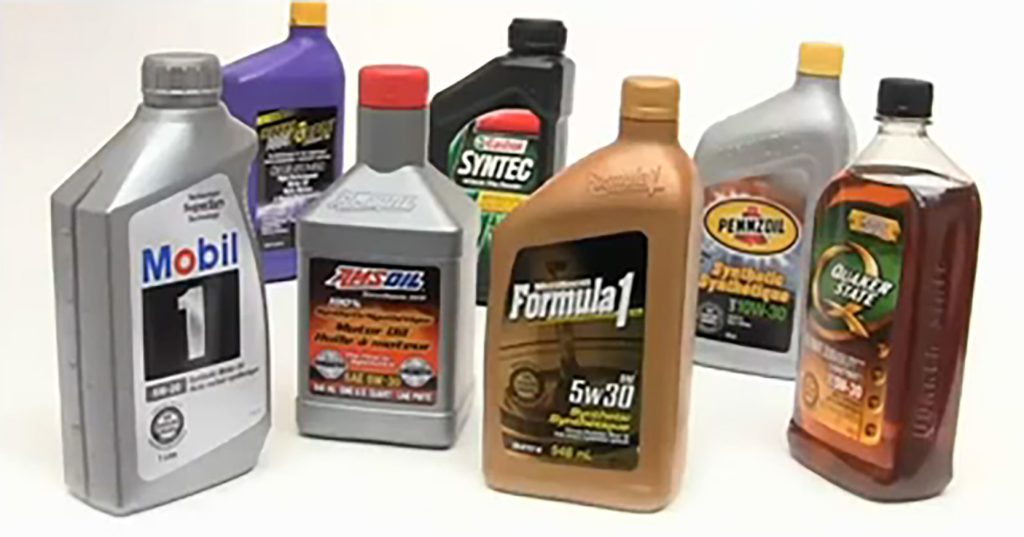
Every time you have your oil changed, whether it is at BennaCDJR or somewhere else, you hear the same question: Synthetic or conventional? And you probably ask yourself: Should I go with synthetic instead? Is there really an advantage? Let’s find out.
Conventional motor oil begins as crude oil that is formed from the refinement process. Synthetics can also trace beginnings as distilled crude oil but are formed from a very different process. The source oil is completely broken down and then rebuilt with artificial petroleum molecules. Looking at conventional motor oil under a microscope reveals molecules with different shapes, sizes, and structures. By contrast, synthetic oil shows molecules of nearly the same size and structure. There are different kinds of synthetic oils with very different properties, but synthetic motor oils are known as polyalphaolefins (PAOs). So any future references to synthetic oil will be about PAOs.
Synthetic Oil Advantages

The American Automobile Association conducted a study comparing synthetic and conventional oils. The short answer for their results is that, on average, synthetic oils performed 47% better than conventional motor oils. Here are the specifics:
Greater Engine Protection
Fully synthetic oils are far more resistant to breaking down from both heat and time, thus will protect your engine for longer. All things being equal, you are more likely to have an engine reach very high miles, such as 200K – 250K miles with synthetic oil.
Cleaner Engine
All conventional oil contains impurities, and these impurities can form deposits. Over time, these deposits will build up in the oil to the point they form a sludge which reduces the oil’s effectiveness. It is one reason you change your oil, but it can start forming before the change. By contrast, synthetic oil contains far fewer impurities and resists sludge and deposit formation.
More Stable Viscosity
Synthetic oils maintain their viscosity better than conventional oil. So it is less prone to get thinner in heat or thicker in the cold. Consequently, it protects your engine more constantly despite ambient and engine temperature.
Longer Lasting
Because of its greater resistance to breaking down, synthetic oil stays effective longer than conventional oil. This can be as much as twice as long, with some brands touting change intervals as long as 15,000 to 25,000 miles. Even so, Stellantus still recommends you change your oil at specified intervals. Also, upgrade your oil filter quality if you plan to retain it for a longer period.
Turbocharger Protection
Because it uses exhaust gases, turbochargers can generate high levels of heat, which can challenge engine oil’s effectiveness. Because synthetic oil is more heat resistant, it is often recommended or at least considered a good idea for turbocharged engines.
Synthetic Oil Disadvantages

- Higher Cost
Synthetic oil sometimes costs twice as much as conventional oil. Unless you stretch your oil changes beyond manufacturer recommendations, the overall cost of oil changes will be higher.
- Though not as common as they used to be, engine break-in periods were a period at the beginning of an engine’s life in which initial friction smoothed out any rough spots in the engine. Ironically, because synthetics lubricate better, they can actually slow down the engine break-in process.
We should point out that there is a myth that once you have synthetic oil in your car, you never go back to conventional oil. There is no truth to this. It’s perfectly safe to switch between or mix synthetic and conventional oil. In fact, conventional oil and synthetic blends are available, which predictably bridge the gap in increased effectiveness and higher cost.
Is synthetic oil better for your engine? In a word: “Yes”. In a few words: “Yes, but it will cost more”. If you want a better chance of your engine lasting to 200K miles or 250K miles, synthetic oil would be a good idea. On the other hand, if you regularly trade your car in at 50-60K miles, it may not be worth it to you. If you still have questions regarding synthetic oil for your model and your goals for it, contact one of our Benna service professionals for specific advice.







